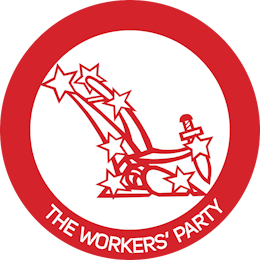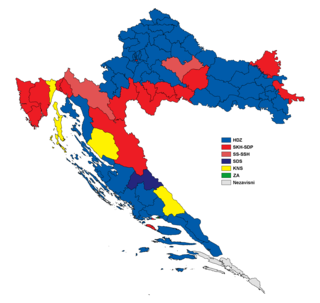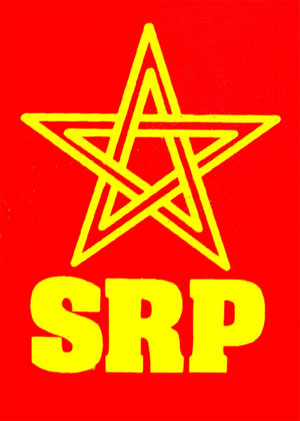The politics of Croatia are defined by a parliamentary, representative democratic republic framework, where the Prime Minister of Croatia is the head of government in a multi-party system. Executive power is exercised by the Government and the President of Croatia. Legislative power is vested in the Croatian Parliament. The Judiciary is independent of the executive and the legislature. The parliament adopted the current Constitution of Croatia on 22 December 1990 and decided to declare independence from Yugoslavia on 25 May 1991. The Constitutional Decision on the Sovereignty and Independence of the Republic of Croatia came into effect on 8 October 1991. The constitution has since been amended several times. The first modern parties in the country developed in the middle of the 19th century, and their agenda and appeal changed, reflecting major social changes, such as the breakup of Austria-Hungary, the Kingdom of Serbs, Croats and Slovenes, dictatorship and social upheavals in the kingdom, World War II, the establishment of Communist rule and the breakup of the SFR Yugoslavia.

The Workers' Party is an Irish republican, Marxist–Leninist communist party active in both the Republic of Ireland and Northern Ireland.

The Ulster Democratic Party (UDP) was a small loyalist political party in Northern Ireland. It was established in June 1981 as the Ulster Loyalist Democratic Party by the Ulster Defence Association (UDA), to replace the New Ulster Political Research Group. The UDP name had previously been used in the 1930s by an unrelated party, which on one occasion contested Belfast Central.

The Croatian Parliament or the Sabor is the unicameral legislature of Croatia. Under the terms of the Croatian Constitution, the Sabor represents the people and is vested with legislative power. The Sabor is composed of 151 members elected to a four-year term on the basis of direct, universal and equal suffrage by secret ballot. Seats are allocated according to the Croatian Parliament electoral districts: 140 members of the parliament are elected in multi-seat constituencies. An additional three seats are reserved for the diaspora and Croats in Bosnia and Herzegovina, while national minorities have eight places reserved in parliament. The Sabor is presided over by a Speaker, who is assisted by at least one deputy speaker.

The Croatian Peasant Party is an agrarian political party in Croatia founded on 22 December 1904 by Antun and Stjepan Radić as Croatian Peoples' Peasant Party (HPSS). The Brothers Radić believed that the realization of Croatian statehood was possible within Austria-Hungary, but that it had to be reformed as a Monarchy divided into three equal parts – Austria, Hungary and Croatia. After the creation of Kingdom of Yugoslavia in 1918, the Party requested for the Croatian part of the Kingdom to be based on self-determination. This brought them great public support which culminated in 1920 parliamentary election when HPSS won all 58 seats assigned to Croatia.

The Croatian Party of Rights is an extra-parliamentary nationalist and neo-fascist political party in Croatia. The word "right(s)" in the party's name refers to the legal and moral reasons that justify the independence and autonomy of Croatia. While the HSP has retained its old name, today it is a far-right party with an ethnocentric platform.

The Croatian Social Liberal Party is a conservative-liberal political party in Croatia. The HSLS was formed in 1989 as the first Croatian political party formed after the reintroduction of the multi-party system.

The Croatian People's Party – Liberal Democrats is a social-liberal political party in Croatia.

Zadar County is a county in Croatia, it encompasses northern Dalmatia and southeastern Lika. Its seat is the city of Zadar.
Regular elections in Croatia are mandated by the Constitution and legislation enacted by Parliament. The presidency, Parliament, county prefects and assemblies, city and town mayors, and city and municipal councils are all elective offices. Since 1990, seven presidential elections have been held. During the same period, ten parliamentary elections were also held. In addition, there were nine nationwide local elections. Croatia has also held three elections to elect members of the European Parliament following its accession to the EU on 1 July 2013.

Parliamentary elections were held in the Socialist Republic of Croatia between 22 and 23 April 1990; the second round of voting occurred on 6–7 May. These were the first free, multi-party elections held in Croatia since 1938, and the first such elections for the Croatian Parliament since 1913. Voters elected candidates for 356 seats in the tri-cameral parliament; the turnout in the first round ranged between 76.56% and 84.54% for various parliamentary chambers. In the second round, the turnout was 74.82%. The Croatian Democratic Union (HDZ) won 205 seats, ousted the League of Communists of Croatia – Party of Democratic Reform (SKH-SDP) from power and ended 45 years of communist rule in Croatia. The new parliament convened for the first time on 30 May, elected Franjo Tuđman as President of the Croatian Presidency and soon after renamed the office to President of Croatia.
Parliamentary elections were held in Croatia on 2 August 1992, alongside presidential elections. They were the first elections after independence and under the new constitution. All 138 seats in the Chamber of Representatives were up for election. The result was a victory for the Croatian Democratic Union, which won an absolute majority of 85 seats. Voter turnout was 75.6%.

Socialist Labour Party of Croatia is a minor socialist party in Croatia, also known as Socialist Workers' Party of Croatia. Their youth wing are the Young Socialists of Croatia.

The Alliance of Independent Social Democrats is a Serb political party in Bosnia and Herzegovina. Founded in 1996, it is the governing party in Republika Srpska, with its leader, Milorad Dodik, serving as the current president of Republika Srpska. The party's vice-president, Željka Cvijanović, is the current member of the Presidency of Bosnia and Herzegovina, while SNSD member Radovan Višković is the current prime minister of Republika Srpska.
The Bridge, previously known as Bridge of Independent Lists until November 2020, is a political party in Croatia founded in 2012. The party is led by Božo Petrov, its founder and the former mayor of Metković, deputy prime minister and speaker of the Croatian Parliament. Although the party leaders initially avoided ideological topics, The Bridge underwent a rebranding prior to the 2020 Croatian parliamentary election, establishing itself as a social conservative and soft Eurosceptic party.
Nevenka Bečić is a Croatian entrepreneur and politician. She was president of the Split city council from 2009 to 2013 and a member of the Croatian Parliament from 2011 to 2015. She is mostly recognized as the sister of Željko Kerum and his right hand when it comes to politics and business.
Centre is a liberal political party in Croatia. The party was formed under the name Pametno in Split in 2015 out of the citizens' initiative Za pametne ljude i pametan grad. The fundamental values endorsed by the party are the promotion of democracy, accountable and transparent management of public resources, civil proactive protection of fundamental human rights, economic development and environmental protection.

Elections were held in Split, Croatia, on 9 June 2014 for the councils of 34 city districts and local committees of Split. The Croatian Democratic Union coalition won 98 council seats, an absolute majority in 10 districts and a relative majority in 6 districts. The Social Democratic Party of Croatia coalition won 45 seats.

The Democratic Alliance of Serbs is a social democratic political party of Serbs in Croatia.
Elections to Cumnock and Doon Valley District Council were held on 5 May 1988, on the same day as the other Scottish local government elections. This was the fifth election to the district council following the local government reforms in the 1970s.














